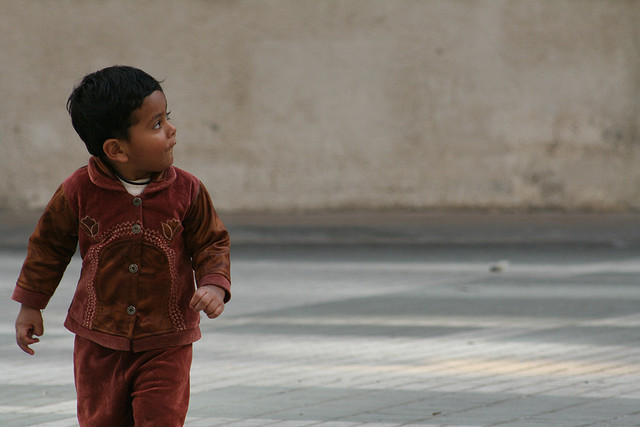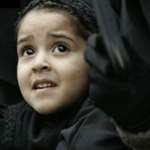
We must admit at the outset that when Islam emerged the rights of the individual were not as they are now. The individual was a small cog in a big wheel: the tribe, then the nation or the group. But in the centuries following Muḥammad's death, the majority of Islamic jurists were unanimous concerning the rights and duties of women, and the duties of servants, slaves and clients.
AS FOR THE CHILDREN, the situation was dire because Muḥammad was unacquainted with fatherly feeling. As a result of this situation, Muḥammad in his Qur’ān ignored children and women until Umm Salama reproached him, following which he came up with some verses about women. Throughout the entire Meccan period (13 years), children were only referred to in four verses:
Wealth and children are an adornment of the life of this world [Qur’ān XVIII (al-Kahf), 46;
Or has He daughters while you have sons? [Qur’ān LII (al-Ṭūr), 39;
On all occasions when he had to talk about children, Muḥammad’s fatherhood atrophy was evident
It is clear here that Muḥammad abhorred girls, as evidenced by these verses in which God protests against associating girls with Him while boys were associated with the ordinary Arab mortals. When he migrated to Madina and initiated the stage of legislation, he ignored children right up to the time of the appearance of Sūrat al-Anfāl – number 88 in order of revelation, and said in it:
And know that your property and your children are a temptation, and that Allah is He with Whom there is a mighty reward.[i]
Then in Sūrat al-Mumtaḥana, which is no. 91 in order, he said,
Your ties of kindred and your children will avail you naught upon the Day of Resurrection.[ii]
Then in Sūrat al-Nūr, no. 102 in order, where he talked about children asking permission from their parents before they enter rooms in the morning, noon, and after the evening prayer. And later in in Sūrat al-Munāfiqūn, no 104 in order, where he said:
O you who believe! let not your wealth, or your children, divert you from the remembrance of Allah.[iii]
It is noticeable here that the Qur’ān incites against children and makes them a fitna a ‘distraction’, a ‘temptation’ to their parents, with no benefit to be expected from them on the Day of Resurrection. He does not mention any rights belonging to them.
The Qur’ān stacks up the cargo of hatred against children in the story of the Allah’s Prophet Al-Khiḍr
On all occasions when he had to talk about children, Muḥammad’s fatherhood atrophy was evident. When he wanted to kill ‘Uqba ibn Ma‘īṭ following the Battle of Badr, ‘Uqba asked him: “What awaits his children, Muḥammad?” Muḥammad’s response was: “Hell”. [iv]
The children of ‘Uqba are destined for Hellfire because their father fought against Muḥammad in Badr, even though his Qur’ān says And a burdened soul cannot bear the burden of another.[v] Then when ‘Ā’isha asked him about the children of the polytheists, he told her that they were in the fire. She said to him: “But they are children who are too young to have sins attributed to them”, and he replied:
“It is your Lord Who knows best what they would be doing” and “by Him whose hand bears my soul,if you wish I will let you hear them screaming in the fire”[vi]
We cannot expect a man who utters such phrases to give children any rights in his law.
The Qur’ān stacks up the cargo of hatred against children in the story of the Allah’s Prophet Al-Khiḍr, when he accompanied Moses as they passed by a village where children were playing on the road. Al-Khiḍr took one of these children and slaughtered him. When Moses asked him why he had killed the child, Al-Khiḍr’s response was that the child’s parents were believers, and Al-Khiḍr feared that the child would lead them astray when he grew up and they would ascribe partners to God.
There is whole bedraggled host of these children in the streets of those cities, precisely because Islam forbids adoption
An obvious hatred of childhood made Muḥammad rule for the killing of this child in consideration of what would happen when the child grew up, even though it was possible that the child’s perceptions might change when he grew up and might become a believer and not overburden his parents. The child, in general, worships what his parents worship, and it is not reasonable to imagine that a child playing with his peers in the street is an infidel while his parents are believers. Ibn Ḥazm al-Andalusī tried to respond to the Mu‘tazila who held that God killed children because he knew that if they lived they would have become unjust titans. He wrote:
Our answer to their talking of a child dying who, if he had lived he would have been a tyrant, is: this is so much the more unjust, if God tortures him for what he has not yet done.[vii]
Ibn Ḥazm here says that Allah is unjust because he made Al-Khiḍr kill the child even though he had not yet led his parents astray.
Neither ancient nor modern Islamic jurists could wriggle out of Muḥammad’s hatred of children and find some jurisprudential legislation that could define the rights of the child in Islam in such a way as to fall in line with the rights recognized by the United Nations, and applied by the vast majority of countries in the world.
As for the child born in Muslim countries, if it is a girl there is nothing sadder than her fate
Let us take a look at what Islamic jurists have done with regard to children’s rights. First of all, the status of the child from the moment of birth: If this child is of unknown parents, i.e. illegitimate, the jurists decreed that this child should be considered a Muslim if he were found in a city or village that had but one single Muslim inhabitant:
The foundling is not to be considered outside Abode of Islam or as part of the Abode of Disbelief. In the, Abode of Islam there are two categories: one of them is the abode designed and delineated by Muslims such as Baghdad, Basra and Kufa; here the bastard is accounted to Islam even if there are more dhimmīs resident therein than Muslims. This is because Islam is supreme and must be subordinated to none. The second category is an abode conquered by Muslims, such as the cities of greater Syria. If there is one Muslim resident therein the foundling is ruled as Muslim, because it is possible that Muslim may later prevail in number.[viii]
As for the infidel, he is not entitled to adopt an illegitimate child:
The infidel does not have the right to pick up a Muslim because no infidel may assume guardianship over a Muslim and because he does not believe in fascinating him and teaching him infidelity, but it is apparent that he will be raising him up in his religion and bringing him up as his child. If he does take on the child, the child is not to remain in that state.[ix]
Because Muḥammad wanted to marry Zaynab bint Jaḥsh, his adopted daughter-in-law, adoption had to be forbidden in Islam. So an unfortunate child that is abandoned by his mother in front of a mosque or a house is to be conveyed by passers-by to an orphanage or a shelter, where he is to live a few years before ending up on the streets of large cities such as Cairo, Casablanca or Khartoum. There is whole bedraggled host of these children in the streets of those cities, precisely because Islam forbids adoption. UNESCO estimates that there are more than two million children living in the streets and cemeteries of Cairo.

Suggested Reading
A foundling child in Muslim countries who does not know his father is not entitled to be added to the official records of the State and is therefore deprived of any rights to education, medical treatment or inheritance. As a result, when the Egyptian government attempted to introduce amendments to the laws on children, including ‘the mother’s right to report her newborn child, record him in the register of births, and obtain his birth certificate attributing him to her as his mother’, the Muslim Brotherhood deputies opposed it since it contravened the Sharī‘a.[x]
As for the child born in Muslim countries, if it is a girl there is nothing sadder than her fate. The little girl is circumcised by her mother or grandmother, her genitals mutilated and the pleasure of sexual intercourse denied her all because while in Madina Muḥammad was passing by and saw a lady circumcising a little girl. Whereupon he said to her:
“Circumcise her, but do not overdo it, that way it is more enjoyable for the husband and more pleasurable to see”.[xi]
This is what the narrators of the hadith claimed to have happened, and female circumcision ever since has become a socio-religious custom in several countries such as Somalia, Yemen, Sudan, Oman, Egypt, and Kenya.
When this child reaches the age of nine, her guardian may marry her to a man who is decades older than her – and when the girl does reach the age of nine, her father may marry her off even against her will, according to al-Mubārakfūrī:
Scholars have differed over marrying off firstborn children when their parents marry off young girls. Most Kufan scholars, as well as others, took the view that if the father marries off the firstborn while she is an adult, without her will and consent, then the marriage is annulled. Some of the people of Madina said: “Marrying the father to the firstborn is permissible, even if she does not wish it. This is the view of Mālik ibn Anas, al-Shāfi‘ī, Aḥmad ibn Ḥanbal and Isḥāq.[xii]
[i] Qur’ān VIII (al-Anfāl), 28.
[ii] Qur’ān LX (al-Mumtaḥana), 3.
[iii] Qur’ān LXIII (al-Munāfiqūn), 9.
[iv] Ibn Hishām السيرة النبوية , vol. 3, p. 194.
[v] Qur’ān XXXV (Fāṭir), 18.
[vi] Musnad Aḥmad, 25743. And Al-Suyūṭī, الدر المنثور في التفسير بالمأثور , Vol 5 on Sūrat Al-Isrā’, verse 12.
[vii] Ibn Ḥazm, الفصل في الملل والأهواء والنِحل , vol. 2, p. 60.
[viii] Ibn Qudāma al-Maqdisī, Kitāb al-Mughnī, Book 26: ‘The Foundling’.
[ix] Ibid.
[x] ‘Abd al-Sattār Ibrāhīm, Al-Sharq al-Awsaṭ, 23/4/2008.
[xi] See كتاب المعجم الصغير للطبراني hadith no. 122 for a similar text.
[xii] Al-Mubārakfūrī , تحفة الأحوذي Section: Marriage.
